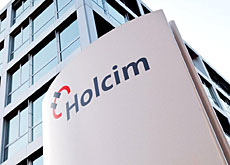Holcim report whets shareholder appetite

The 2004 report of cement giant Holcim makes a refreshing change from most company reports, which focus on the financial ups and downs of the past year.
In the introduction, Holcim explains to shareholders why it pounced twice in January to announce major planned acquisitions, one in Britain and the other in India.
Basically known as a cement producer, Holcim surprised more than one analyst with its move to acquire Britain’s Aggregate Industries, which has leading positions not only in Britain but also in the United States.
With 8,500 employees, Aggregate produces gravel, crushed stone, sand, asphalt, and ready-mixed concrete at over 650 sites. It doesn’t produce cement but uses plenty of it.
The acquisition, at a price of £1.8 billion (SFr4 billion), isn’t cheap but the strategists at Holcim, number two in the global market, have been looking a long way down the road in mature markets.
“What we’ve observed is that over time, when markets get more and more mature, some other products, activities and segments are creating value – namely aggregates, ready-mix, and maybe even asphalt, paving, concrete blocks etc.,” Benoît Koch, in charge of North America and Britain, told swissinfo.
Tailor-made
He describes the acquisitions in both Britain and India – the target there with Gujarat Ambuja Cements is a majority stake in the Associated Cement Companies (ACC), as well as full ownership of Ambuja Cement Eastern – as “tailor-made”.
“In India, it’s clearly emerging, so there is a focus on cement. In the case of Aggregate Industries, which is active in the UK and the US, it’s clearly a mature market, so we follow the aggregate line,” he added.
While the planned British acquisition has captured much of the headlines because of the price tag, India holds out much promise with its emerging status.
Paul Hugentobler, who is responsible for South Asia at Holcim, makes no bones about his enthusiasm for one of the biggest cement markets in the world.
“It’s growing by seven to nine per cent a year, which means ten million [metric] tons more in absolute terms. India is extremely important for Holcim, as it is offering this wonderful growth potential in which we want to participate,” he said.
Consolidation
Consolidation in India has reached the stage where the top five producers control nearly 60 per cent of the market.
“We are acquiring the number two [company], so we have right from day one a very solidly-performing platform, with a strong balance sheet and a strong management on which we can build,” Hugentobler added.
He explained that Holcim wanted to grow as fast as the market, meaning it would have to add one and a half to two million tons of capacity every year.
Total investment for the Indian acquisitions comes to around SFr900 million or around a quarter of that for Britain’s Aggregate.
ACC is India’s oldest cement company and a household name for many.
Cement icon
“ACC is the cement icon of India. It has a very solid reputation because of the history, so in a market where 60 per cent is used for residential housing, the brand name counts.”
“I’m sure Holcim and ACC have a unique opportunity to build on the past and (forge) an incredible successful future together,” Hugentobler told swissinfo.
Consolidation in the global cement industry to gain market share continues, with Cemex, the world’s third-largest cement manufacturer, on Tuesday completing its $4.1 billion acquisition of Britain’s RMC group.
But Holcim, despite its planned acquisitions, does not seem to be in a rush to become the number one in the marketplace, after losing the top spot to Lafarge of France a few years ago.
Holcim’s Koch puts it this way: “I hope we never lost the number one spot in the market in terms of reputation and profitability, so we’re happy with it. We’re not looking at size. We are looking at profitability and respect,” he said.
swissinfo, Robert Brookes in Zurich
2004 net profit: SFr914 million (+33.2 per cent over 2003)
Holcim (formerly known as Holderbank) says it is confident about the outlook for 2005.
With global economic growth expected to remain solid, Holcim expects to see an improvement in results in the current financial year too.
Holcim says its “solid” balance sheet has allowed it to make major planned acquisitions in Britain and India.
A capital increase last year allowed the company to underpin investments made since 2001 and buy out minority shareholders at Holcim Apasco in Mexico.
At the end of the year, Holcim secured a majority position in Cemento de El Salvador.

In compliance with the JTI standards
More: SWI swissinfo.ch certified by the Journalism Trust Initiative










You can find an overview of ongoing debates with our journalists here . Please join us!
If you want to start a conversation about a topic raised in this article or want to report factual errors, email us at english@swissinfo.ch.